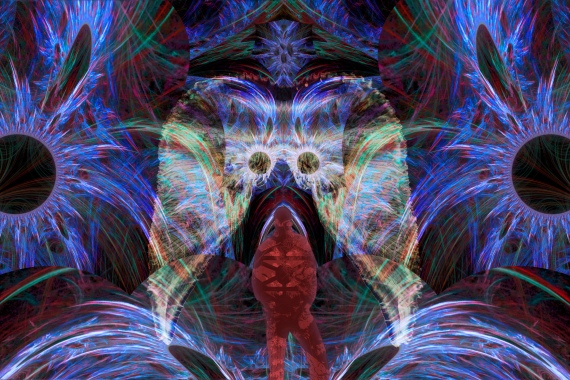“Very nice,” I said. “But why did you bring me up here?”
“It’s time for you to see the fnords,” he replied. Then I woke up in bed and it was the next morning. I
made breakfast in a pretty nasty mood, wondering if I’d seen the fnords, whatever the hell they were,
in the hours he had blacked out, or if I would see them as soon as I went out in the street. I had some
pretty gruesome ideas about them, I must admit. Creatures with three eyes and tentacles, survivorsfrom Atlantis, who walked among us, invisible due to some form of mind shield, and did hideous
work for the Illuminati. It was unnerving to contemplate, and I finally gave in to my fears and peeked
out the window, thinking it might be better to see them from a distance first.
Nothing. Just ordinary sleepy people, heading for their buses and subways.
That calmed me a little, so I set out the toast and coffee and fetched in the New York Times from the
hallway. I turned the radio to WBAI and caught some good Vivaldi, sat down, grabbed a piece of
toast and started skimming the first page.
Then I saw the fnords.
The feature story involved another of the endless squabbles between Russia and the U.S. in the UN
General Assembly, and after each direct quote from the Russian delegate I read a quite distinct
“Fnord!” The second lead was about a debate in Congress on getting the troops out of Costa Rica;
every argument presented by Senator Bacon was followed by another “Fnord!” At the bottom of the
page was a Times depth-type study of the growing pollution problem and the increasing use of gas
masks among New Yorkers; the most distressing chemical facts were interpolated with more
“Fnords.”
Suddenly I saw Hagbard’s eyes burning into me and heard his voice: “Your heart will remain calm.
Your adrenalin gland will remain calm. Calm, all-over calm. You will not panic. You will look at the
fnord and see it. You will not evade it or black it out. You will stay calm and face it.” And further
back, way back: my first-grade teacher writing FNORD on the blackboard, while a wheel with a
spiral design turned and turned on his desk, turned and turned, and his voice droned on,
IF YOU DON’T SEE THE FNORD IT CAN’T EAT YOU, DON’T
SEE THE FNORD, DON’T SEE THE FNORD . . .
I looked back at the paper and still saw the fnords.
This was one step beyond Pavlov, I realized. The first conditioned reflex was to experience the panic
reaction (the activation syndrome, it’s technically called) whenever encountering the word “fnord.”
The second conditioned reflex was to black out what happened, including the word itself, and just to
feel a general low-grade emergency without knowing why. And the third step, of course, was to
attribute this anxiety to the news stories, which were bad enough in themselves anyway.
Of course, the essence of control is fear. The fnords produced a whole population walking around in
chronic low-grade emergency, tormented by ulcers, dizzy spells, nightmares, heart palpitations and
all the other symptoms of too much adrenalin. All my left-wing arrogance and contempt for my
countrymen melted, and I felt genuine pity. No wonder the poor bastards believe anything they’re
told, walk through pollution and overcrowding without complaining, watch their sons hauled off to
endless wars and butchered, never protest, never fight back, never show much happiness or eroticism
or curiosity or normal human emotion, live with perpetual tunnel vision, walk past a slum without
seeing either the human misery it contains or the potential threat it poses to their security . . . Then I
got a hunch, and turned quickly to the advertisements. It was as I expected: no fnords. That was part
of the gimmick, too: only in consumption, endless consumption, could they escape the amorphous
threat of the invisible fnords.
I kept thinking about it on my way to the office. If I pointed out a fnord to somebody who hadn’t been de-conditioned, as Hagbard deconditioned me, what would he or she say? They’d probably read
the word before or after it. “No this word,” I’d say. And they would again read an adjacent word. But
would their panic level rise as the threat came closer to consciousness? I preferred not to try the
experiment; it might have ended with a psychotic fugue in the subject. The conditioning, after all, went back to grade school. No wonder we all hate those teachers so much: we have a dim, masked
memory of what they’ve done to us in converting us into good and faithful servants for the Illuminati.
— From Robert Shea and Robert Anton Wilson, Illuminatus
And so it goes. Now obviously Mrs Shea and Wilson were speaking in allegorical terms. Sometimes tho when my son comes home from school and he starts talking about what he was taught that day I begin to wonder
Click on image to see full-size
 Electric Pathways by G A Rosenberg
Electric Pathways by G A Rosenberg


